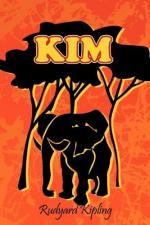’Not I,” Kim laughed uneasily. ’I go to look for — for a bull — a Red. Bull on a green field who shall help me.’ Boylike, if an acquaintance had a scheme, Kim was quite ready with one of his own; and, boylike, he had really thought for as much as twenty minutes at a time of his father’s prophecy.
‘To what, child?’ said the lama.
‘God knows, but so my father told me’. I heard thy talk in the Wonder House of all those new strange places in the Hills, and if one so old and so little — so used to truth-telling — may go out for the small matter of a river, it seemed to me that I too must go a-travelling. If it is our fate to find those things we shall find them — thou, thy River; and I, my Bull, and the Strong Pillars and some other matters that I forget.’
‘It is not pillars but a Wheel from which I would be free,’ said the lama.
‘That is all one. Perhaps they will make me a king,’ said Kim, serenely prepared for anything.
‘I will teach thee other and better desires upon the road,’ the lama replied in the voice of authority. ‘Let us go to Benares.’
‘Not by night. Thieves are abroad. Wait till the day.’
‘But there is no place to sleep.’ The old man was used to the order of his monastery, and though he slept on the ground, as the Rule decrees, preferred a decency in these things.
‘We shall get good lodging at the Kashmir Serai,’ said Kim, laughing at his perplexity. ‘I have a friend there. Come!’
The hot and crowded bazars blazed with light as they made their way through the press of all the races in Upper India, and the lama mooned through it like a man in a dream. It was his first experience of a large manufacturing city, and the crowded tram-car with its continually squealing brakes frightened him. Half pushed, half towed, he arrived at the high gate of the Kashmir Serai: that huge open square over against the railway station, surrounded with arched cloisters, where the camel and horse caravans put up on their return from Central Asia. Here were all manner of Northern folk, tending tethered ponies and kneeling camels; loading and unloading bales and bundles; drawing water for the evening meal at the creaking well-windlasses; piling grass before the shrieking, wild-eyed stallions; cuffing the surly caravan dogs; paying off camel-drivers; taking on new grooms; swearing, shouting, arguing, and chaffering in the packed square. The cloisters, reached by three or four masonry steps, made a haven of refuge around this turbulent sea. Most of them were rented to traders, as we rent the arches of a viaduct; the space between pillar and pillar being bricked or boarded off into rooms, which were guarded by heavy wooden doors and cumbrous native padlocks. Locked doors showed that the owner was away, and a few rude — sometimes very rude — chalk or paint scratches told where he had gone. Thus: ‘Lutuf Ullah is gone to Kurdistan.’ Below, in coarse verse: ’O Allah, who sufferest lice to live on the coat of a Kabuli, why hast thou allowed this louse Lutuf to live so long?’




